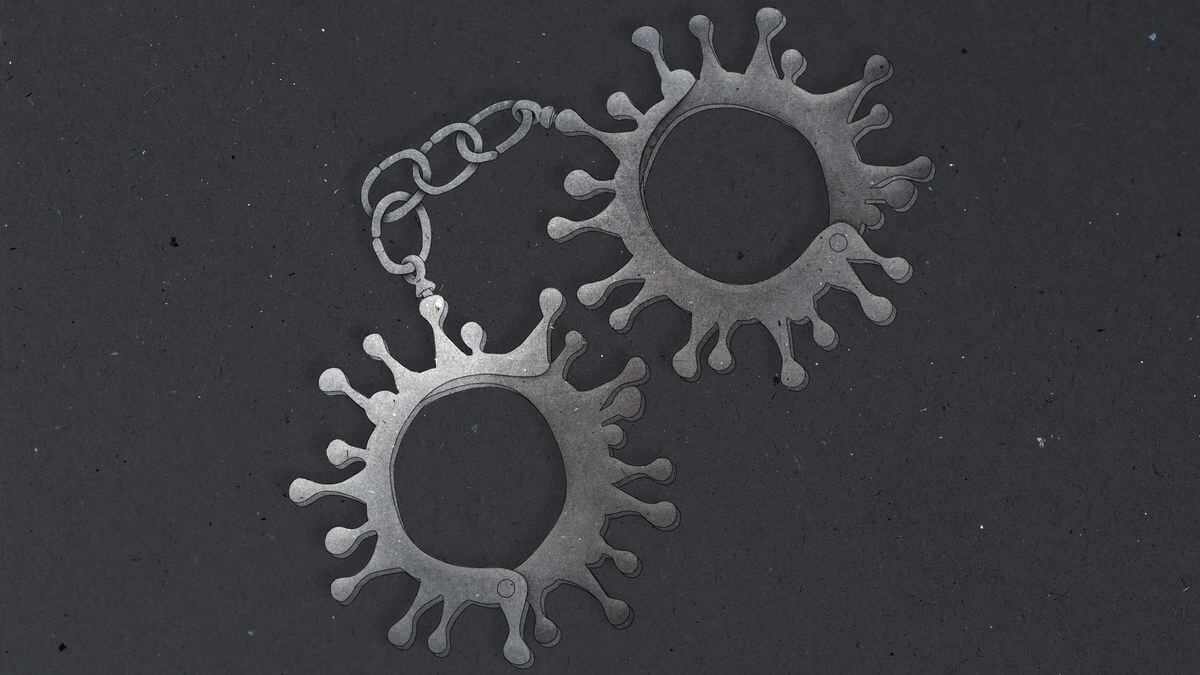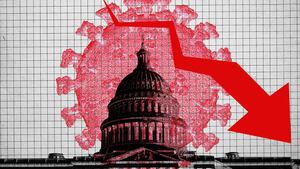In Kenton County, a mid-sized Kentucky jurisdiction just across the river from Cincinnati, fears of the novel coronavirus have shown signs of paralyzing law enforcement.
“Normally have anywhere from six to 20 felony arrests a day,” Rob Sanders, the top prosecutor in the county, told The Daily Beast on Friday. “Yesterday we had two: one for a warrant that was issued months ago and another for a methamphetamine case. The day before, we had one arrest all day.”
While the county of over 150,000 inhabitants only had one confirmed case of COVID-19 as of Thursday, Sanders said there had been “very little proactive policing” as a result of officers implementing CDC social distancing guidelines and growing anxiety over the pandemic.
“Police aren’t conducting routine traffic stops unless the driver is doing something to put others in danger,” Sanders said. “Police are not stopping as many suspicious people on the street either. They might run them off, but they’re staying 6 feet away, so fewer people are being searched, patted down for weapons, and run for warrants.”
The Kenton County Police Department acknowledged these new precautions, but a spokesperson told The Daily Beast officers were still “dedicated to keeping our community safe, and nothing has changed with that.”
Already, incarcerated citizens in Kenton County are being released in hopes of slowing the spread of the virus, allowing those facing felony gun and drug trafficking violations to be released on bail—a freedom that would “never be allowed normally,” according to Sanders.
A week ago, he added, the Kenton County Jail had 711 inmates. By Friday, the jail’s population had decreased by over 2 percent and continued to drop as prosecutors, judges, and defense attorneys scrambled to get one step ahead of a virus that has impacted all 50 states. (The Kenton County Detention Center did not immediately respond to a request for comment.)
“We’re almost out of ankle monitors,” Sanders said, laughing, noting the device has proven to be the easiest solution to justify releasing non-violent or repeat offenders on bail. “Normally we have an unlimited supply of ankle monitors... we’re realizing we just never have dealt with anything remotely like this.”
But the prosecutor wasn’t too concerned about the possibility of lax policies in his jurisdiction having an impact on crime, he said. After all, he has his own problems: the mass disruption COVID-19 will likely create backlogs in an already strained court system.
New struggles to enforce old laws are popping up around the country right now, as daily operations of the criminal justice system have increasingly ground to a halt in the face of the novel coronavirus pandemic.
Those struggles, in turn, have both law enforcement and criminal-justice reform activists eyeing the potential for permanent changes to a uniquely American system.
“This is uncharted territory here—both in its scope and size,” William Raftery, a spokesman for the National Center for State Courts, told The Daily Beast. “Frankly, the Spanish flu is the only benchmark we have for judicial buildings being closed for this long—and the Spanish flu is not a good benchmark.”
Attempts to slow the spread of the deadly coronavirus have forced more than 27 states and dozens of localities to suspend jury trials and close courthouses while simultaneously ensuring people accused of crimes aren’t deprived of their right for due process.
In Washington, D.C., the Supreme Court has postponed oral arguments, including a case involving President Donald Trump’s tax returns. In Los Angeles, jurors for the highly anticipated murder trial of real estate heir Robert Durst have been asked to go home for three months
“The coronavirus requires a challenging balance of rights: the rights of the defendant to a speedy trial and a trial by a jury of their peers against the rights of courtroom actors and jury members to their health,” Theodore Wilson, assistant professor at the University of Albany’s School of Criminal Justice, told The Daily Beast.
In an attempt to reduce the high-risk of the coronavirus spreading within jails, several jurisdictions have pushed for special bail hearings to implement social distancing practices for both inmates, visitors, and correctional staff.
In Cuyahoga County, Ohio, judges held special sessions to send more defendants home—or to negotiate plea deals that they would not have previously been awarded. Counties in Texas and California have gone so far as to start releasing some inmates.
Brooklyn District Attorney Eric Gonzalez said Tuesday his office would not prosecute low-level offenses that don’t jeopardize public safety, explaining that, in this public health emergency, “it is imperative we also protect those who might be exposed to the coronavirus.” Philadelphia police enacted a similar policy on Wednesday, as officers have been instructed to stop making arrests for certain non-violent crimes, though the commissioner there stressed they would not “turn a blind eye.”
Denver Chief Judge Michael Martinez ordered on Friday that inmates who have a month left on their sentence, those who may be most susceptible to contracting the coronavirus in prison, or those who were serving in work release programs be released early to reduce prison density.
While criminal justice advocates are frantic about the possibility of inmates getting left behind during the pandemic, many are hopeful the screeching judicial pause has the ability to upend the current justice system and be the final push forward reform nationwide.
“I think this will trigger long-term systemic change—I mean, this is worse than 9/11,” Justine Olderman, executive director of the Bronx Defenders, which provides legal services to low-income families in New York, told The Daily Beast.”This is worse than anything we have ever encountered.”
With all the optimism for the future, however, Olderman admitted she was also terrified. As recently as last week, she said, public defenders in her office saw the New York Police Department continue to arrest at normal numbers, the District Attorney’s office continue to prosecute, and the court continue to place people in jail despite the “virus spreading like wildfire.”
“The worst-case scenario for the criminal justice system in this pandemic? Inaction,” she told The Daily Beast on Thursday, stating that containment inside jails could mean contracting the virus or destabilizing their homelives. “Inaction for our clients, unfortunately, means that many many people will die. “
On Wednesday, an inmate in New York City’s Rikers Island was reported to have contracted the novel coronavirus, hours after union officials announced a corrections officer also tested positive. While the inmate was the first person to test positive for COVID-19 while in city custody, Olderman suggested more cases were “just a matter of time, and will only lead to a super spread in an environment that already has known to have health issues.”
“If we don’t push for reform while this lockdown continues, we are leaving our clients helpless to the disease,” she said.
Seemingly piggybacking off Olderman’s outrage, the Legal Aid Society in New York filed an unprecedented lawsuit on Friday, seeking the immediate release of 116 elderly or ailing inmates in pretrial detention or who were being held on a parole violation at Rikers Island and other local jails. The lawsuit seeks to release the inmates on grounds of continuing to incarcerate them on bail, noting that jail conditions make it impossible to protect those most at risk of contracting COVID-19.
“New York cannot leave people in jails behind to suffer and die,” the lawsuit states. The Legal Aid Society and New York City Department of Correction were set to argue this lawsuit to a judge on Friday. The Department of Correction did not immediately respond to The Daily Beast’s request for comment.
Weldon Angelos, a previously incarcerated Utah music producer who once worked with Snoop Dogg and Tupac Shakur, has seen first-hand how an already slow jail and prison system does not always prioritize its inmates during a medical crisis.
During his 13-year imprisonment on a low-level drug offense, Angelos contracted the swine flu—a fate he says could have been avoided if prison guards did not force inmates to bunk with those who were already infected.
“They had nothing in place for the swine flu—and we all caught it,” the 40-year-old said, adding that he was only given generic allergy medicine to treat his symptoms. “I was probably the sickest I had ever been in my life. [I] thought I was going to die there.” (The Utah Department of Corrections did not immediately respond to a request for comment.)
While he was released five years later—thanks to a 2013 bipartisan campaign that included advocacy from Alicia Keys—Angelos said his time in jail jump-started his advocacy for those imprisoned on account of non-violent drug offenses.
He is now desperately advocating for releases during this pandemic, arguing the coronavirus pandemic is “the worst thing” that could happen to a system that, by essence, responds “extremely slowly.”
While he believes prisons are taking precautions to ensure other inmates don’t contract the coronavirus, he believes the response will force many of those showing minimal symptoms to be placed in solitary confinement—a place that is usually reserved for punishment.
“If you have it and are stuck in the SHU [Security or Special Housing Unit, a.k.a. The Hole] for a month for no reason, that’s terrible,” he said. “What I’m hearing from people in prison now, is that they are not doing much, and people are freaking out.”
The federal Bureau of Prisons, which currently lists more than 175,000 inmates currently serving sentences, was taking action to update their guidance on internal inmate movements "to provide clarification" and ensure the safety of everyone in the system, a spokesperson told The Daily Beast on Friday.
So far, the spokesperson said, the Bureau has implemented staggering meal and recreation time in certain, often cramped, areas to reduce density.
Sanders stressed that while he believed while there was a necessity to release more people from jail to stop the spread of COVID-19, his jurisdiction was just not prepared for the aftereffects of the pandemic.
In his county, nearly every inmate accused of a nonviolent offense was being considered for release, forcing his team to work on “hundreds of cases at once” and all electronically—something that has never happened in his 21 years in public service, he said.
“In a sense, this is like a giant experiment with ‘no money bail’ because we’re releasing so many defendants we usually wouldn’t,” Sanders told The Daily Beast.
The experiment, he believes, will fail once court schedules return to normal—the idea being that many accused defendants will not show up to hearings. It would be hard to even follow up on those cases, he admitted, because a system already “bursting at the seams” will likely be even more sluggish after the pandemic is brought under control.
“I think it’s safe to say we’ll never see some of these defendants again, or at least not until they’re arrested,” he said.
Despite the pressures to balance civil order and moral policing, the National District Attorneys Association was not yet concerned—at least officially—that the delay had reached catastrophic levels.
“From a realistic standpoint, postponements happen in the criminal justice system all the time,” said Duffie Stone, president of the organization that represents over 5,000 state and local prosecutors nationwide, and himself a prosecutor in South Carolina. “Nobody really has a choice here, but people should not panic about this just yet.”
Angelos, along with a slew of criminal justice advocates, disagreed.
“It’s simple. If nobody gets in and helps [prevent] those incarcerated from getting this pandemic, everyone inside will get sick,” he said. “And if everyone gets sick, people will die. That’s something I don’t know if America will ever be able to bounce back from.”








